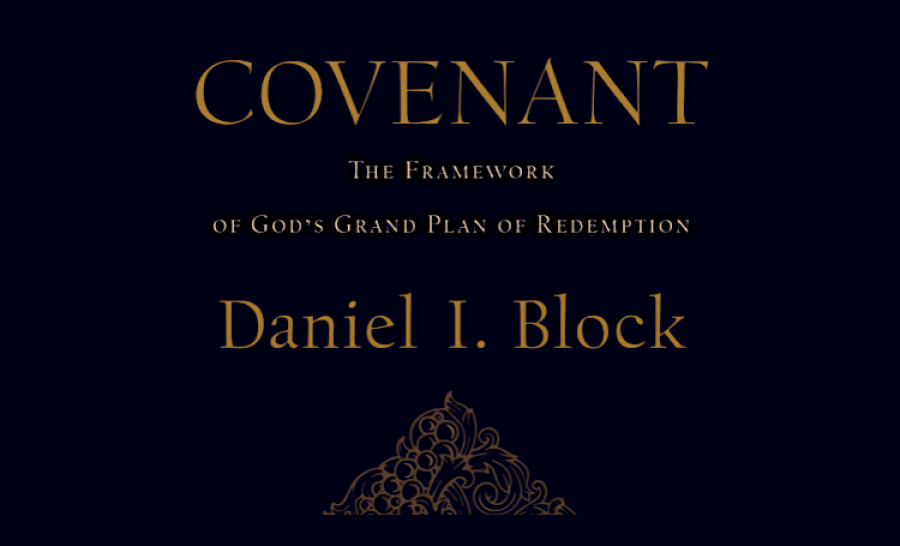Review of ‘Covenant’ by Daniel I. Block (Part 1)
Image

A Review of Daniel I. Block, Covenant: The Framework of God’s Grand Plan of Redemption, Grand Rapids: Baker, 2021, 704 pages, hdbk.
Daniel Block has been a major evangelical OT scholar for many years, contributing commentaries on Ezekiel, Deuteronomy, and Judges/Ruth, and many articles. He is known for his incisive and creative scholarship. Therefore, this contribution to the study of covenants in the Bible is most welcome.
As someone with familiarity with Block’s work I fully expected Covenant to be marked by independent thinking and fresh insight. Both qualities are to be seen in this large work. As someone who has a decided interest in the subject I think it best if I begin my review with some general comments.
- Block decided not to interact with the scholarship on covenants in this book. for the most part this was a good choice, although occasionally one feels this reduces the interpretative options of certain passages and concepts.
- Block is not satisfied with some of the traditional nomenclature of the biblical covenants. This leads him to rename the Noahic covenant the “Cosmic covenant,” with an additional “Adamic covenant” which he also thinks he sees in Genesis 9. The Abrahamic and Mosaic (or Sinaitic) covenants together are the “Israelite covenant,” with the New covenant being dubbed “the New Israelite covenant.”
- Block sees the Abrahamic covenant, the Mosaic covenant, and even the New covenant as one continuous covenant.
- He doesn’t like the term “Old Testament” either, preferring “First Testament” (the New Testament retains its name).
- The book contains a lot of helpful exegesis, much background information placed inside the narrative, and ample word studies. Sometimes the examination of texts can mean heavy-sledding for readers. The text is read carefully, even pedantically in places. Because of this it is easy to loose sight of the covenant being discussed.
- Although he sticks to a chronological approach Block’s method has a tendency to view God from a distance rather than personally. Yahweh is referred to in a way similar to how false gods are treated. It is the same for biblical personages; Noah, Abraham (slightly less so), David, etc. are studied dispassionately as if they were simply people who lived a long time ago. E.g., Moses is studied with the same kind of aloofness as Gudea of Lagash. This impression may be somewhat subjective, but I believe it ought to be mentioned.
- The definition of “covenant” is disappointingly “loose.”
- The “Priestly” covenant (e.g., Num. 25) is called the “Levitical covenant” and is dealt with only in a lengthy but unsatisfying Excursus. Block avoids its connotations in Ezekiel 40 – 48, Jeremiah 33, etc.
- Block rejects the “conditional/unconditional” concept, choosing to keep the former while calling God’s unilateral oaths “irrevocable.”
- Speaking of oaths, the author spends very little time on the importance of the oaths within God’s covenants.
- Block believes that the instructions (torah) from Exodus to Deuteronomy were doable. His arguments for this are important, if a little optimistic. If Israel could perform the requirements of the Mosaic code, so can we. If that is so why do Israel (or we) need a spiritual rebirth?
- He includes a lot of comparisons from the ANE. Sometimes these are helpful, while at other times they seem to dictate his interpretations.
- Although he does hold to and expound messianic passages, it is not always done compellingly (e.g. Psalm 110). He tries to fit these texts within the historical context (sometimes speculated) of the passage. The predictive element is occasionally obscured.
- Block has no room for pre-Noahic covenants including the theological covenants of covenant theology.
- He is to be commended for providing a rare study of covenant in the New Testament.
In the coming weeks I shall attempt to discuss this important book, noting what I think are it’s strengths and weaknesses. I envisage four installments in all, but may need to add a summary post.
Paul Henebury Bio
Paul Martin Henebury is a native of Manchester, England and a graduate of London Theological Seminary and Tyndale Theological Seminary (MDiv, PhD). He has been a Church-planter, pastor and a professor of Systematic Theology and Apologetics. He was also editor of the Conservative Theological Journal (later Journal of Dispensational Theology). He is now the President of Telos School of Theology.
- 317 views
This is great Paul. On your recommendation, I read “Sealed With an Oath” years ago and really benefited. Interested in seeing whether this book would make a good reference tool. So far it sounds more like a work of theology but I guess I’ll find out in the coming articles.
In some ways it is a strange work in that although packed with material it lacks dynamism.
Dr. Paul Henebury
I am Founder of Telos Ministries, and Senior Pastor at Agape Bible Church in N. Ca.




Discussion